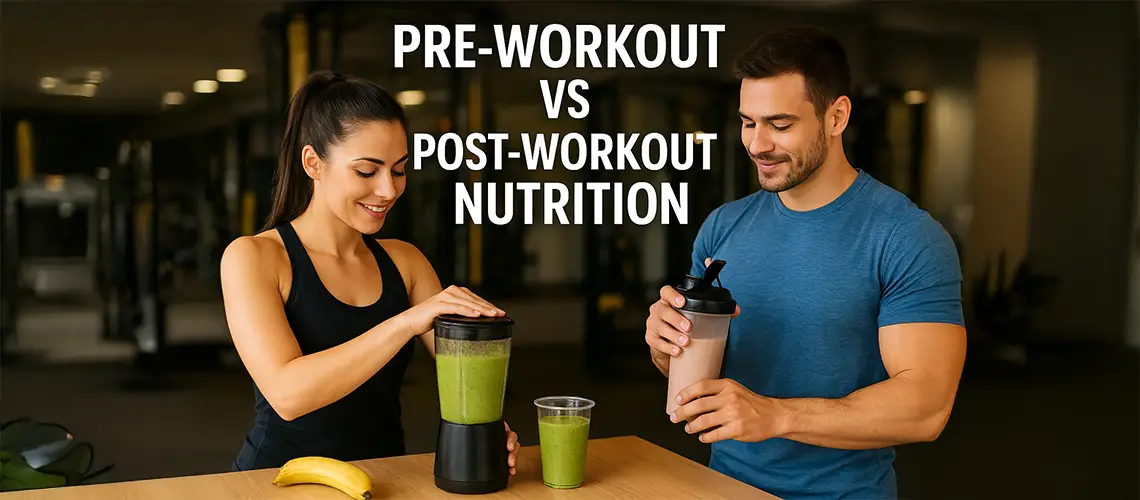Pre-Workout vs Post-Workout Nutrition: Fuel Your Fitness Right
Whether you’re a beginner hitting the gym or a seasoned fitness enthusiast, what you eat before and after your workouts can make a huge difference in your performance, energy levels, and recovery. Understanding the distinction between pre-workout and post-workout nutrition helps you optimize your training results, build muscle, and maintain energy.
When it comes to fitness, nutrition timing can be just as important as the exercises themselves. Whether your goal is weight loss, muscle gain, or endurance, knowing the difference between pre vs post workout meals can maximize your results. In this guide, we’ll break down what to eat, when to eat, and why it matters.
Workout Fuel:
Eating before a workout fuels your body and enhances performance. A proper workout meal should include carbohydrates for energy and moderate protein for muscle support. Healthy workout snack examples:
Oats with a scoop of protein powder
Banana with peanut butter
Greek yogurt with berries
Tip: Avoid heavy or fatty meals before training, as they can slow digestion and reduce energy levels. For more on meal timing, check Healthline’s pre-workout nutrition guide.
Post-Workout Meals:
After training, your muscles need protein for repair and carbs to replenish glycogen. A good workout meal aids in faster recovery and reduces soreness. Some effective options include:
Grilled chicken with quinoa and vegetables
Protein smoothie with fruit and milk
Salmon with sweet potato
Studies show that consuming protein within 30-60 minutes post workout improves muscle protein synthesis (American Council on Exercise).
1. Why Nutrition Timing Matters
Nutrition timing refers to eating specific nutrients at the right times to maximize performance and recovery. Eating the wrong foods at the wrong time can leave you feeling sluggish during workouts or hinder your recovery afterward. Proper pre and post workout nutrition fuels your muscles, supports protein synthesis, and maintains overall energy.
2. Pre Workout Meals: Fuel for Performance
The goal of nutrient timing before training is to provide your body with energy to perform at its best. Ideally, consume a combination of complex carbohydrates and moderate protein 1–3 hours before training.
Best Pre Workout Foods
Oatmeal with banana and nuts
Greek yogurt with berries
Whole-grain toast with peanut butter
Protein smoothie with fruit
Energy bars with natural ingredients
Tips for Pre Workout Meals:
Focus on easily digestible carbs for energy
Include protein to prevent muscle breakdown
Avoid high-fat and high-fiber foods right before training (they may cause discomfort)
Pre-workout nutrition ensures you have sustained energy, improve focus, and reduce muscle fatigue during exercise.
3. Post Workout Nutrition: Recover and Rebuild
The goal of post workout nutrition is recovery. After training, your body needs protein to repair muscles and carbohydrates to replenish glycogen stores. Ideally, eat within 30–60 minutes after exercise for optimal results.
Best Post Workout Foods
Grilled chicken with quinoa and vegetables
Protein shake with almond milk and banana
Cottage cheese with fruit
Egg omelet with avocado and whole-grain toast
Smoothie bowls with protein powder
Tips for Post Workout Meals:
Prioritize high-quality protein for muscle repair
Include carbs to restore energy
Rehydrate with water or electrolyte drinks
Proper workout nutrition reduces muscle soreness, speeds up recovery, and supports muscle growth and strength gains.
4. pre and post workout meals: Key Differences
| Aspect | Pre-Workout | Post-Workout |
|---|---|---|
| Goal | Fuel energy & performance | Repair & recover muscles |
| Nutrients | Carbs + protein | Protein + carbs |
| Timing | 1–3 hours before exercise | Within 30–60 min after exercise |
| Benefits | Increased stamina, focus | Reduced soreness, muscle growth |
Understanding these differences helps you plan meals strategically to maximize results.
5. Quick Tips for Success
Hydration is key: Drink water before, during, and after workouts.
Listen to your body: Everyone’s digestion is different; adjust timing and portion sizes.
Keep snacks simple: Avoid overly processed foods.
Consistency matters: Regular nutrient timing improves performance over time.
Key Tips for Optimal Nutrition:
Hydrate well before, during, and after workouts.
Balance your macronutrients – carbs, protein, and healthy fats.
Time your meals strategically – eat pre-workout 1–2 hours before, and post-workout within an hour.
Listen to your body – adjust portion sizes and food choices based on energy and performance levels.
Conclusion
Mastering pre and post workout meals can elevate your gym performance, speed up recovery, and help you reach your fitness goals faster. Fuel smart, train hard, and recover effectively – your body will thank you!
For more tips on workouts and fitness nutrition, check out our Fitness Tips Blog and explore healthy meal ideas that complement your gym routine.
Understanding nutrition before and after exercise is crucial for anyone serious about fitness. With the right timing, meal choices, and hydration, you can boost energy, enhance muscle growth, and speed up recovery. Start applying these tips today to see better results in the gym and improve your overall fitness journey.
To learn more about gym nutrition, check our Beginner’s Guide to Fitness Nutrition and Top 10 Fitness Supplements.

